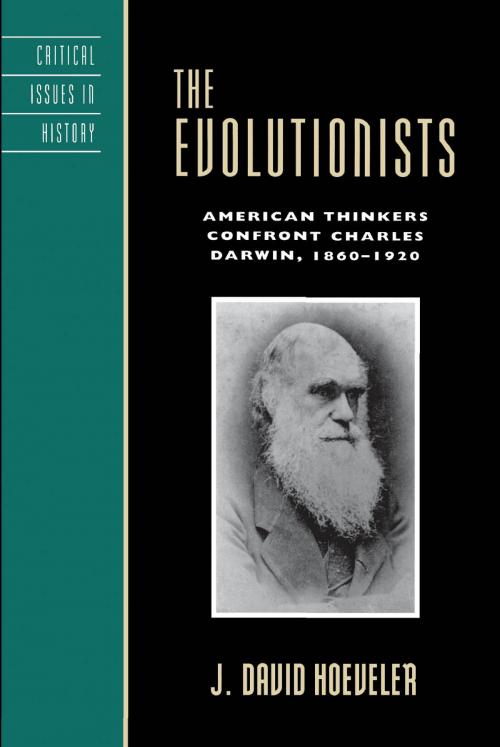The Evolutionists
American Thinkers Confront Charles Darwin, 1860–1920
Nonfiction, History, Americas, United States, 19th Century, Religion & Spirituality, Christianity, Christian Life| Author: | J. David Hoeveler | ISBN: | 9780742579323 |
| Publisher: | Rowman & Littlefield Publishers | Publication: | March 15, 2007 |
| Imprint: | Rowman & Littlefield Publishers | Language: | English |
| Author: | J. David Hoeveler |
| ISBN: | 9780742579323 |
| Publisher: | Rowman & Littlefield Publishers |
| Publication: | March 15, 2007 |
| Imprint: | Rowman & Littlefield Publishers |
| Language: | English |
Charles Darwin published his monumental treatise The Origin of Species in 1859. It has proved to be a major contribution to scientific theory but highly contentious as well. In the United States, more than in any other country, Darwin's theory of evolution became, and remains, a matter of "political" controversy, from the famous "monkey trial" of 1925 to efforts, even in the 21st century, to diminish its influence in American public schools.
Many people think of the Darwinian disputes as a matter of science versus religion. This book looks back to the first half-century or so of the Darwinian reception in the United States and portrays a much more complex situation. It shows that among many religious thinkers evolution received a welcome and formed the basis of a "new theology." The Evolutionists reminds us that America's most prominent scientist furnished a thoroughgoing criticism of Darwin.
The Evolutionists has a special feature in its chapter structure. After examining the pre-Darwinian world of European science and then reviewing the career of Darwin, it offers pairings of American thinkers in the several categories of American thought where Darwinian ideas had their largest impact. Thus, reviewing the scientific reception of Darwin it compares Louis Agassiz and Asa Gray; among Orthodox Protestants Charles Hodge and James McCosh; in Protestant Liberalism, Henry Ward Beecher and John Bascom. It reviews evolution's impact on American sociology through William Graham Sumner and Lester Frank Ward, and on feminism, the ideas of Charlotte Perkins Gilman and Eliza Burt Gamble. A chapter on Methodologies pairs Thorstein Veblen with Oliver Wendell Holmes, Jr., and the concluding chapter on philosophy examines William James and John Dewey.
Charles Darwin published his monumental treatise The Origin of Species in 1859. It has proved to be a major contribution to scientific theory but highly contentious as well. In the United States, more than in any other country, Darwin's theory of evolution became, and remains, a matter of "political" controversy, from the famous "monkey trial" of 1925 to efforts, even in the 21st century, to diminish its influence in American public schools.
Many people think of the Darwinian disputes as a matter of science versus religion. This book looks back to the first half-century or so of the Darwinian reception in the United States and portrays a much more complex situation. It shows that among many religious thinkers evolution received a welcome and formed the basis of a "new theology." The Evolutionists reminds us that America's most prominent scientist furnished a thoroughgoing criticism of Darwin.
The Evolutionists has a special feature in its chapter structure. After examining the pre-Darwinian world of European science and then reviewing the career of Darwin, it offers pairings of American thinkers in the several categories of American thought where Darwinian ideas had their largest impact. Thus, reviewing the scientific reception of Darwin it compares Louis Agassiz and Asa Gray; among Orthodox Protestants Charles Hodge and James McCosh; in Protestant Liberalism, Henry Ward Beecher and John Bascom. It reviews evolution's impact on American sociology through William Graham Sumner and Lester Frank Ward, and on feminism, the ideas of Charlotte Perkins Gilman and Eliza Burt Gamble. A chapter on Methodologies pairs Thorstein Veblen with Oliver Wendell Holmes, Jr., and the concluding chapter on philosophy examines William James and John Dewey.















